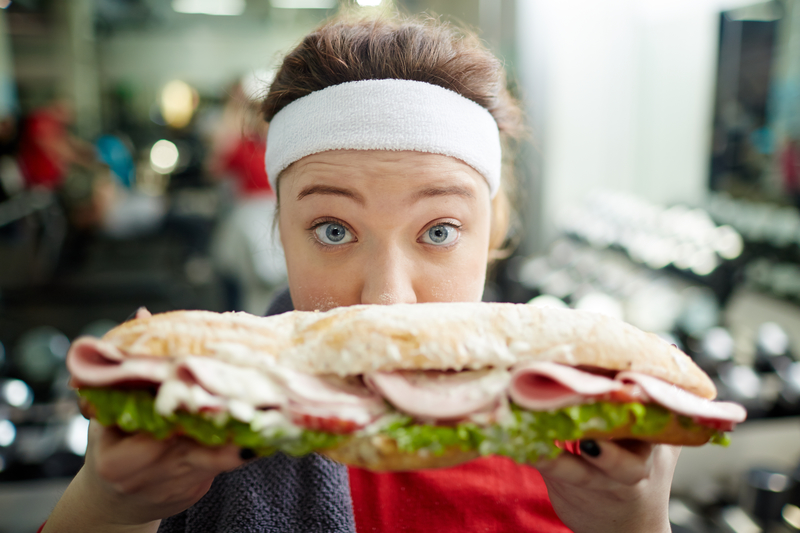Ask the Coaches: Does Stress Cause Weight Gain?

– Stressed-Out Sara
A: Thanks for sending your “SOS” to us, Sara! We have heard from a lot of women and men who also struggle with the battle of losing weight while dealing with a stressful lifestyle. In fact, for everyone we know, stress is a part of life. And, of course, we’ve all seen the ads proclaiming it isn’t our fault we’ve gained weight—it’s the stress!
So, it’s understandable to wonder if now is the right time to start a new program. After all, you already have an overwhelming number of tasks on your to-do list and numerous people relying on you for, well, everything!
Let’s stop and take a deep breath — or six of them if you’re looking to lower your blood pressure and heart rate — to relax just a little. Grab a nice cup of ice water or tea, sit back, and relax as we look at the connection between stress and weight gain and whether now is a good time to lose weight (or if it’s even possible).
Why does stress lead to weight gain?
For starters, it’s important to point that the “stress hormone” cortisol (which goes hand-in-hand with stress) isn’t inherently bad. In fact, it’s vital for adaptation and survival. For example, cortisol helps raise blood sugar levels, which is crucial when energy is needed — such as in the face of perceived stress, exercise, and fasting.
However, issues arise when stress (and chronically elevated levels of cortisol) is long-lasting. In excess, cortisol can negatively impact heart health, body weight, energy levels, feelings of well-being, and more.
When it comes to stress and weight gain, the connection seems to be multi-faceted:
- Eating behaviors and diet quality
- Biological processes
With regard to the latter, excess stress — or the inability to cope with stress — can directly contribute to storing more belly fat…and that sounds like something you’ve experienced first-hand. Studies have shown that folks with high waist-hip ratios (relatively more belly fat) tend to have poor coping skills and secrete more cortisol when faced with a stressful situation, and additional studies have identified a similar association between cortisol concentrations, coping skills, chronic stress, and excess belly fat.
You see, the enzyme that “activates” cortisol from its inactive form is far more prevalent in belly fat tissue (also called visceral fat) than other parts of the body. What’s more, visceral fat tissue has greater blood flow and four times as many cortisol receptors than other areas of the body. On top of that, research shows that cortisol ramps up a process called lipogenesis, which means that it increases the body’s capacity to create and store fat.
On the other side of the coin, as you may have experienced, stress tends to have a tremendous impact on eating behaviors and diet quality. In general, stress is associated with higher caloric intake, increased saturated fat and sugar consumption, and poor diet quality.
Even though it’s not the case for everyone, stress tends to trigger “emotional eating” for many people, and emotional eaters typically eat more frequently and indulge in highly palatable, high-calorie, sweet, high-fat “junk foods” and “comfort foods” in response to stress. Research shows that about 70% of people increase their food intake during periods of stress, and women, overweight folks, and people who tend to obsess about food and body weight are more likely to overeat when stressed.
Anxiety also is likely to lead to mindless eating, while you’re focusing your thoughts on stressful events rather than the food you’re chewing, how much you’ve consumed, or even what it tastes like. This can lead to folks eating more yet feeling less satisfied with what they eat.
What’s more, a survey reported by the American Psychological Association (“Stress in America”) found 42% of the respondents reported watching more than 2 hours of TV a day to cope, which also tends to lead to overeating as well as being less active. Additionally, according to the same survey, stress also causes 40% of us to lie awake late into the night, and skipping out on sleep is a surefire way to increase appetite, make you more inclined to choose poor-quality, high-calorie foods, and ultimately, gain weight.
This all adds up to the “it’s not your fault” formula so often quoted: “More stress = more cortisol = more junk food = more belly fat.”
Fortunately, however, this is not the end of the story. You have more control over both your stress and your eating than you may think. Even if your life is filled with stress, there are steps you can take to outsmart the seemingly inevitable and vicious stress and weight gain cycle.
Stress and Weight Gain: 5 Ways to Reverse the Trend
1. Exercise
Exercise can have a profound effect on the stress and weight gain formula because it increases metabolism, helping you burn more calories; it can help regulate levels of stress hormones; it can help increase resilience and stress tolerance; and it increases levels of chemicals in the body shown to relieve pain and boost mood. With even just a minimal workout, you can drastically reduce the negative effects of stress and weight gain.
What type of exercise? As always, we recommend whatever you can fit into your schedule (which sounds pretty hectic already) and you can do regularly. This can be a nice evening walk with the dog after dinner to decompress, a 7-minute calorie-torching HIIT workout first thing in the morning, or hitting the weights at the gym several times a week (or all of the above). The benefits of a regular, balanced workout routine are far-reaching, cannot be overstated, and include much more than just stress relief.
#2: Sleep
Making sleep a priority sets you up for success. A well-rested body and mind better cope with stress; on the other hand, lack of sleep has been tied to numerous issues, such as a higher risk for obesity, diabetes, heart disease, and disrupted cortisol rhythms (which can further affect your sleep). Lack of sleep also increases sensitivity to pain, and people who don’t get enough sleep are likely to get sick more often. Finally, those who don’t sleep enough are more likely to have accidents, whether driving, at work, or at home.
Getting 7 to 9 hours of sleep might feel challenging at first, yet making sleep a priority will make it well worth it by providing you with more energy, greater productivity, clearer thinking, and a better mood.
#3: Be Mindful
Many of us think about a monk sitting for hours in a lotus position under a tree when we think of mindfulness, but you don’t need to sit and meditate for hours to become more mindful. (Good thing because with your busy day, how could you ever find time for that!) While meditating is wonderful and highly recommended, moments of mindfulness can be found throughout your day every day.
Sitting at a stoplight? Take time to breathe deeply and just be as you wait. At the pickup line for the kids? Again, take a few moments to yourself to put down the phone, turn off the radio, and focus on your breath. Sitting down to eat? Take five to ten long, deep breaths to center yourself and focus on the meal in front of you. Cleaning up the dishes after dinner? Watch how the water hits the plate, the colors of the bubbles, and the sound of the dishes as they slide together and allow yourself to get lost in the moment.
Mindfulness is also a tremendous tool for putting the kibosh to the stress and weight gain issue. Is that pint of ice cream really solving your problems? Speaking of which…
#4: The Comfort Food Myth
What if the whole idea of “comfort foods” was a myth? Well, recent research has shown that foods we’ve associated as “comfort foods” isn’t really all that comforting. In fact, researchers from the University of Minnesota have shown that comfort foods provide no more comfort than other foods or even no food at all.
Now that you know the truth about “comfort food,” you may be able to look at your choices a bit differently. Feeling stressed? Rather than reaching for junk food, which offers no comfort and often leads to guilt, do something that will actually make you feel better like getting a hug, going for a walk, spending time in nature, or just taking a deep breath.
#5: Get Social Support
As we’re now discovering, social support is one of the absolute most important aspects for a healthy, happy life. Benefits include increased self-esteem and feelings of worth, enhanced sense of belonging and purpose, more empathy for others, more kindness to self and others, a healthier immune system and faster recovery from illness, lowered rates of depression and anxiety, reduced stress and increased ability to cope with stress, and increased happiness. Sadly, however, authentic social connections and meaningful social interactions are dramatically declining while suicide rates are dramatically increasing (according to a recent report from the CDC).
We are meant to be a part of a tribe, and we thrive when we have a sense of community. So, take time to strengthen your most important relationships — like those with your teens and your parents — practice random acts of kindness to strangers, and show appreciation for co-workers, family, and friends to build and connect more deeply with your tribe.
Stress and Weight Gain: A Recap
While it is true that stress and weight gain are deeply intertwined, it doesn’t mean that it’s inevitable to continue to gain weight when stress levels rise — or that it’s impossible to lose weight if you lead a life that you perceive to be stressful. Finding better ways to cope with stress, like the five steps discussed above, can dramatically change the formula from “More stress = more cortisol = more junk food = more belly fat” to “Stressful events = deeper connections + more exercise + sleep as a priority + being more mindful + healthier food = weight loss and less belly fat.”
You are in charge of how you react to stress and taking better care of yourself allows you to better take care of others. With practice, you may find bad stress (distress) turning into good stress (eustress), so you make better decisions.
There may never be a “right time” to make self-care a priority — and waiting until you hit a tipping point may be too late. So, why not use this as your starting bell, inviting you to make positive changes now and conquer the stress and weight gain cycle.
Here’s a quote that fits perfectly: “Bad companies are destroyed by crisis. Good companies survive them. Great companies are improved by them.” Now, replace the word “companies” with “people.” Are you going to allow stress to destroy you? Or, are you going to use this as an opportunity to not just survive but thrive? You might as well. After all, stress isn’t likely to ever go away, but with better choices, your belly fat surely will.
Good luck, Sara, on your journey! And let us know if you have any other questions.








